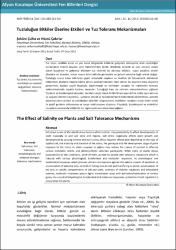| dc.contributor.author | Çulha, Şeküre | |
| dc.contributor.author | Çakırlar, Hüsnü | |
| dc.date | 2014-11-20 | |
| dc.date.accessioned | 2014-11-20T12:28:11Z | |
| dc.date.available | 2014-11-20T12:28:11Z | |
| dc.date.issued | 2011 | |
| dc.identifier.issn | 2147-5296 | |
| dc.identifier.uri | http://hdl.handle.net/11630/845 | |
| dc.description.abstract | Tuz stresi, özellikle kurak ve yarı kurak bölgelerde bitkilerin gelişimini etkileyerek ürün verimliliğini sınırlandıran önemli abiyotik stres faktörlerinden biridir. Bitkilerde osmotik ve iyon stresine neden olarak büyümeyi ve gelişmeyi etkileyen tuz stresinin bu olumsuz etkileri; tuzun çeşidine, stresin düzeyine ve süresine, strese maruz kalan bitkinin genotipine ve gelişim evresine bağlı olarak değişir. Tuzluluğa maruz kalan bitkilerde çeşitli metabolik olayların ve özellikle de fotosentetik aktivitenin etkilenmesi bitkilerin hayatta kalma şansını azaltabilmektedir. Bazı bitkiler bu koşullara karşı duyarlılık gösterirken, bazıları çeşitli fizyolojik, biyokimyasal ve moleküler cevaplar ile indüklenen tolerans mekanizmalarıyla hayatta kalmayı başarırlar. Tuzluğuğa karşı bu tolerans mekanizmalarını sağlayan fizyolojik ve biyokimyasal cevapları; iyonların seçici olarak biriktirilmesi veya atılımı, kökte iyon alımının ve sürgüne iletiminin kontrolü, iyonların bitkide ve hücrelerde belirli bölümlerde biriktirilmesi, osmotik düzenleyicilerin sentezi ve antioksidan sistemler oluştururken; moleküler cevapları sinyal iletim yolları ile çeşitli genlerin aktivasyonu ve /veya inaktivasyonu oluşturur. Fizyolojik, biyokimyasal ve moleküler cevapların sonucunda bitkilerde tuz regülasyonunun korunması sağlanır. | en_US |
| dc.description.abstract | Salt stress is one of the abiotik stress factors which restricts crop productivity to affect developments of plant especially in arid and semi arid regions. Salt stress negatively affects plant growth and development by causing osmotic and ionic stress, these negative effects alter depending on the type of applied salt, the intensity and duration of the stress, the genotype and the development stage of plant exposure to the stress. In plants exposed to salinity may reduce the chance of survival to affected various metabolic events and photosynthetic activities particularly. While some of plants shows susceptibility to this conditions, some of them achieve to survive with tolerance mecanisms which is induced with various physiological, biochemical and moleculer responses. As physiological and biochemical responses which provide tolerans mechanisms aganist the salinity consist of excretion or accumulation of selective ions, controls of taking ions at root and transfering to shoot, accumulation of the ions at spesific compartments of cell and plant, synthesis of osmotic regulators and antioxidant systems, molecular responses occurs signal transmission ways with activation/inactivation of various genes. As a result of physiological, biochemical and moleculer responses, protection of salt regulation is procured at the plants. | en_US |
| dc.language.iso | tur | en_US |
| dc.publisher | Afyon Kocatepe Üniversitesi | en_US |
| dc.rights | info:eu-repo/semantics/openAccess | en_US |
| dc.subject | Tuz Stresi, Tuz Toleransı, Morfolojik ve Oksidatif Değişiklikler, Tolerans Mekanizmaları | en_US |
| dc.title | Tuzluluğun Bitkiler Üzerine Etkileri ve Tuz Tolerans Mekanizmaları | en_US |
| dc.title.alternative | The Effect of Salinity on Plants and Salt Tolerance Mechanisms | en_US |
| dc.type | article | en_US |
| dc.relation.journal | Fen Bilimleri Dergisi | en_US |
| dc.department | Hacettepe Üniversitesi, Fen Fakültesi, Biyoloji Bölümü | en_US |
| dc.identifier.volume | 11 | en_US |
| dc.identifier.startpage | 11 | en_US |
| dc.identifier.endpage | 34 | en_US |
| dc.identifier.issue | 2 | en_US |
| dc.relation.publicationcategory | Makale - Ulusal Hakemli Dergi - Kurum Yayını | en_US |



















